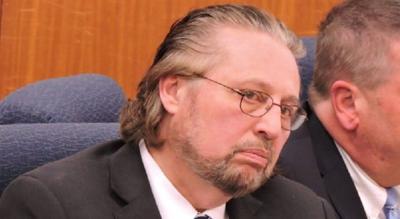
WHEELING – A suspended Wheeling attorney has been convicted on 29 counts of fraud and money laundering for fraudulently handing client funds and using client funds to conduct unlawful monetary transactions.
A federal jury found Paul J. Harris, 62, guilty November 13 of all 29 counts he had been charged with in September. Harris was released Thursday on his personal recognizance.
Sentencing has not yet been scheduled, but Harris faces up to 20 years in federal prison for each of the mail and wire fraud counts and up to 10 years in prison for each of the unlawful monetary transaction counts. The government also is seeking a monetary judgement, restitution for the victims, as well as the forfeiture of the property of Harris Law Offices in Wheeling.
“Attorneys are meant to relieve clients of their stressors,” U.S. Attorney Matthew L. Harvey said in a press release. “Mr. Harris preyed on vulnerable clients who trusted him with their money and legal matters, betraying that trust through unethical acts.
“I commend the jury for their verdict and for delivering justice to the victims.”
During the seven-day trial in Wheeling, the federal jury heard testimony about how Harris used client funds for personal expenses, such as the purchase of his home and paying for his law office, without the clients’ permission. Harris received and moved funds from his client trust account to his law firm operating account, at times using one client’s money to pay funds he had misappropriated from other clients.
Harris originally was indicted June 3 on 42 counts mail fraud, wire fraud, bank fraud and unlawful monetary transactions related to his allegedly fraudulent and unlawful handling of client funds between April 2014 and June 2025.
That case was dismissed in September and was refiled later that month with 29 counts. He faces up to 20 years in federal prison for each of the mail and wire fraud counts, up to 30 years in federal prison for each of the bank fraud counts, and up to 10 years in federal prison for each of the unlawful monetary transaction counts.
The West Virginia Rules of Professional Conduct say attorneys are required to keep funds, including funds to pay legal fees and funds to be used to pay expenses of the representation, in a separate account designated as a client’s trust account. It’s usually called an Interest on Lawyers Trust Accounts, or IOLTA account.
An attorney can withdraw legal fees and expenses paid in advance but only as the fees were earned or expenses were incurred. An attorney is allowed to deposit his own funds in his IOLTA account for the sole purpose of paying bank service charges on that account, but only in an amount necessary for that purpose.
Harris had an IOLTA account and other accounts at Main Street Bank, the indictment states.
The indictment said Harris “devised and intended to devise a scheme and artifice to defraud and obtain money from clients by means of materially false and fraudulent pretenses, representations and promises and for the purpose of executing the scheme and artifice to defraud and obtain money from his clients, did knowingly deliver and cause to be delivered by mail according to the direction thereon, a matter or thing, and did knowingly transmit and cause to be transmitted in interstate and foreign commerce, by means of wire communications, certain signs and signals.”
It claims Harris would have clients send him or entrust him with substantial amounts of money, including advance payments of fees, inheritance funds, settlement funds and property sale proceeds.
“Harris would commingle client funds with non-client funds by moving client funds from his IOLTA account to his law firm operating account, where he converted the client funds to his own use to fund payments that were unrelated to the representation of the client,” the indictment stated. “Harris would use some of the commingled funds of one client to make payments that he owed to another client to conceal his misuse of client funds and to lull and forestall action by his clients and others.
“Harris would make false and misleading statements to his clients and to others and would make statements to his clients and to others that omitted materially important information about his use of client funds, to conceal his misuse of client funds and to lull and forestall action by his clients and others.”
According to the most recent 19-page federal indictment, Harris agreed to hold in trust about $700,000 in inheritance for one client. That client began to transfer the funds to Harris after Harris told the client there was potential civil liability from an April 2014 vehicle accident involving the client’s adult son that resulted in a fatality.
“Harris deposited these funds in his (Interest on Lawyers Trust Account) account,” the indictment states. The client began asking for the funds in August 2019 so they could be handled by a financial adviser. “Harris gave (the client) checks totaling $370,000.”
Harris agreed to represent another client in a federal criminal tax investigation. That advance payment of $50,000 was deposited in the Harris’ IOLTA account in late 2017, according to the indictment.
A third client hired Harris to handle first- and third-party claims regarding a mine subsidence dispute on a contingency fee basis as well as other family matters including ones related to federal income tax delinquencies.
“In or about November 2020, as a retainer for the other family matters, (the third client) transferred $300,000 to the IOLTA account of Harris,” the indictment states. “In or about March 2021, as part of a settlement of the first-party claim, an insurance company issued a check of $200,000, made payable to Harris and (the third client), which was deposited in the IOLTA account of Harris.
“In or about April 2021, (the third client) transferred over $600,000 of real property sale proceeds to the IOLTA account of Harris to be used for the exclusive purpose of curing (1) state and federal income tax delinquencies of (the third client) and (the third client’s) family, and (2) child support delinquencies of (the third client’s) son.”
A fourth client was a member of a class action Harris agreed to represent in 2021.
“In or about November 2022, as part of a settlement, the defendant in the civil action issued checks payable to the plaintiffs totaling $3,500,000, all of which were deposited in the IOLTA account of Harris, including a check of $1,000,000 made payable to (the fourth client),” the indictment states.
Assistant U.S. Attorneys Jarod J. Douglas and Jennifer T. Conklin prosecuted the case on behalf of the government, and the matter was investigated by the Federal Bureau of Investigation and the Internal Revenue Service Criminal Investigation.
U.S. District Judge John Preston Bailey presided.
In March, the West Virginia Supreme Court suspended Harris’ law license for two years. He also ordered to pay the costs of the disciplinary proceedings as well as nearly $35,000 to one of the clients in question.
U.S. District Court for the Northern District of West Virginia case number 5:25-cr-00034 (originally 5:25-cr-00028)






